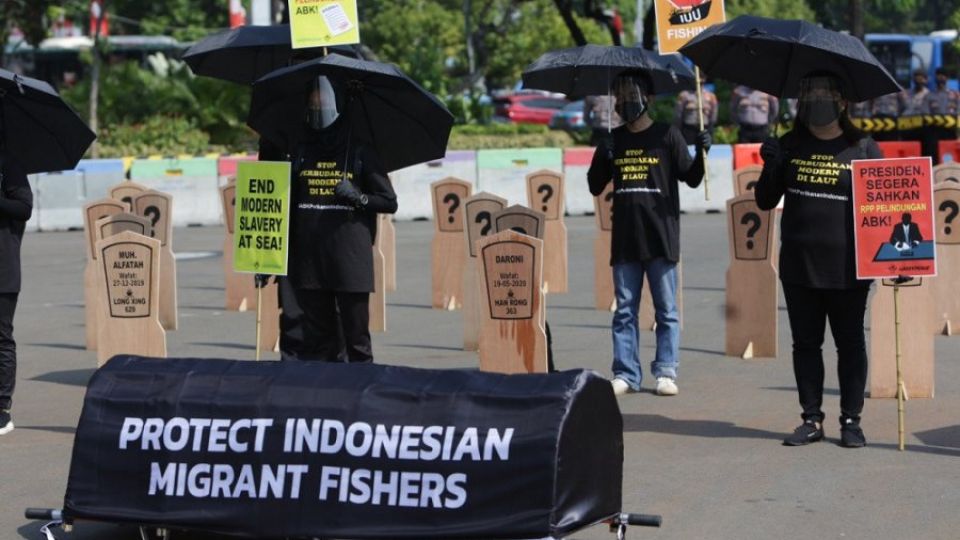January 8, 2024
JAKARTA – The government is working on an agreement with Taiwan to protect Indonesian migrant fishers amid increasing cases of human rights violations against them.
Taiwan has long been a magnet for Indonesian migrant fishers, with nearly 220,000 workers working on Taiwanese vessels between 2013 and 2015, the largest number of any country, according to data from the Foreign Ministry.
The agreement would regulate the process of employing migrant fishery workers, and would cover several issues including worker protection, stakeholders’ rights and obligations, standard work contracts, wages and cost structure.
Details on the said provisions will be discussed further with Taiwanese stakeholders, said Rendra Setiawan, the Manpower Ministry’s migrant worker protection and placement director.
“The government is currently coordinating internally to formulate provisions on the protection of Indonesian migrant fishers in Taiwan as mandated by the law,” Rendra told The Jakarta Post in a recent interview.
News about the inadequate working and living conditions for migrant workers in Taiwan or on Taiwanese fishing vessels has frequently made the headlines over the past decade.
Read also: Forced labor of Indonesian crewmen persists on foreign vessels: Report
The conditions have improved over time as Indonesian migrant fishers have received identity cards to access insurance from Taiwanese authorities, according to a 2022 study by the Indonesian Ocean Justice Initiative (IOJI).
But Taiwan and mainland China remain precarious countries for Indonesian workers, as severe human rights violations, including human trafficking and smuggling, are frequently reported from both.
In Taiwan, placement permits for Indonesian workers working on fishing ships in the territorial sea are granted by the Taiwanese Ministry of Labor. The documents are issues under an agreement regulating protections for formal workers.
But permits for people working at sea are issued by the Ministry of Agriculture, with no agreement between Indonesia and Taiwan on how to regulate them, Rendra said.
“There’s a need for a legal framework […] that can give optimal protection for Indonesian migrant fishers [who work] at sea,” he continued.
IOJI researcher Jeremia Humolong Prasetya conveyed his hopes that the agreement would monitor Indonesian workers’ rights fulfillment by authorities of other countries where Taiwanese-flagged vessels often sail to or anchored in, such as the Pacific nations of Fiji and Mauritius as well as several nations in Africa.
“[The agreement] should also mandate the establishment of a working committee consisting of government representatives, labor unions, civil society members, academics, ship manning agency associations and fishing vessel owners to regularly set and evaluate the standards of worker rights,” Jeremia said.
Weak regulations
The government issued a 2022 government regulation (PP) on the placement and protection of migrant trading and fishing vessel crews, which was expected to set a comprehensive framework for migrant fishing industry workers.
However, its implementation remains insufficient as the regulation only mandates the protection of Indonesian workers before they leave for their destination countries, not while they are working in the host countries or in distant waters, said Arnon Hiborang, head of the fisheries crew union in North Sulawesi and a former migrant fisherman.
Rendra said the regulation stipulated protection prior to working on the vessel by the Indonesian Economic and Trade Office (KDEI) in Taipei, and during the work period by the employers or each Indonesian migrant worker’s placement company (P3MI).
“If any problem arises, the P3MI [will] handle and resolve it [through] coordination with the employer,” the ministry’s director said.
Jeremia also urged the Manpower Ministry to issue a regulation that would serve as a technical reference for other ministries, regional and village administrations in protecting the migrant seafarers.
“To date there are still few local or village administrations that include the protection of migrant workers, including fishery workers, in their regulations and regional planning,” he said.
Other problems the researcher highlighted was the authority’s dualism on permit issuance for Indonesian fishery workers overseas between the Manpower Ministry and Transportation Ministry. Such bureaucratic confusion results in the absence of integrated placement data, contributing to the weak protection by the government.
The IOJI urged President Joko “Jokowi” Widodo’s administration to end such dualism on permit issuance by giving full authority to the Manpower Ministry. (alf)


